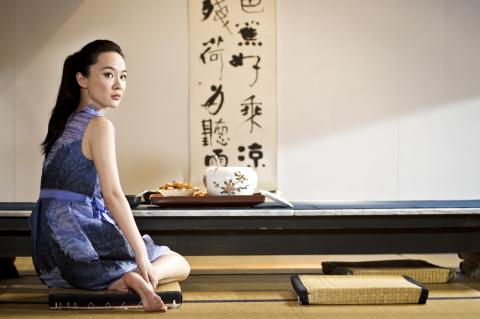Eighteen years after Ang Lee’s (李安) Eat Drink Man Woman (飲食男女) hit the big screen, the film’s producer Hsu Li-kong (徐立功) and award-winning television director Tsao Jui-yuan (曹瑞原) are releasing what’s billed as the sequel, Joyful Reunion (飲食男女—好遠又好近), which stars one of the original cast, Kui Ya-lei (歸亞蕾).
The film relies on the same concept of mixing food and human relationships, but content-wise it’s not sequel at all. The result, a narratively uneven tale about two families in China and Taiwan, delivered with a message of reunification, is nothing like Lee’s 1994 work, which explores familial relations and social reality.
In present-day Hangzhou, China, aging chef Tang Shizhe (Kenneth Tsang, 曾江) and his two daughters lead respectable and comfortable lives, thanks to the father’s prosperous vegetarian restaurant.

Photo courtesy of Activator Marketing Company
The elder daughter, Wa’er (Huo Siyan, 霍思燕), whose boyfriend, Chang Chuan (Blue Lan, 藍正龍), is a slightly nerdy computer game designer from Taipei, manages a luxury health resort.
One day Chang takes his aunt, Pai Ping (Kuei), who raised him like her own son, back to Hangzhou after a trip to Taipei.
To Ping, the Chinese city, which she grew up in and has not visited after fleeing to Taiwan during the Chinese Civil War, looks unrecognizable at first. But she soon settles into the luxurious surroundings at the resort where Wa’er works.
Meanwhile, Shizhe announces his plan to sell the restaurant because the chronic illness he suffers from is starting to take its toll. While agonized by her father’s condition, Wa’er is fed up with being neglected by Chang, who spends too much time in the virtual world, and decides to break up with him.
In an attempt to get the two back together, Pai phones Shizhe, who invites her to his restaurant for a feast. When the elders meet, memories come rushing back.
The film’s most glaring flaw is its structurally shaky screenplay, which was penned by six writers and two contributors, who are credited with “script coordination.”
While the movie’s most enjoyable moments are when the screen is dominated by Kui’s high-energy performance, she sometimes overdoes the comic delivery.
Anchored by Tsang’s quiet poise, Kui moves freely from a forthright, loud-mouthed waishengren (外省人, or person who fled to Taiwan after the Chinese Civil War) visiting The New China, to a woman reliving the emotions of her past life.
As the English title suggests, Joyful Reunion is more of a fairy-tale in which two generations learn to get along and live happily ever after. Whether the film is politically naive, or just a cynical ploy to tap China’s market, is up to the audience to decide.

William Liu (劉家君) moved to Kaohsiung from Nantou to live with his boyfriend Reg Hong (洪嘉佑). “In Nantou, people do not support gay rights at all and never even talk about it. Living here made me optimistic and made me realize how much I can express myself,” Liu tells the Taipei Times. Hong and his friend Cony Hsieh (謝昀希) are both active in several LGBT groups and organizations in Kaohsiung. They were among the people behind the city’s 16th Pride event in November last year, which gathered over 35,000 people. Along with others, they clearly see Kaohsiung as the nexus of LGBT rights.

Jan. 26 to Feb. 1 Nearly 90 years after it was last recorded, the Basay language was taught in a classroom for the first time in September last year. Over the following three months, students learned its sounds along with the customs and folktales of the Ketagalan people, who once spoke it across northern Taiwan. Although each Ketagalan settlement had its own language, Basay functioned as a common trade language. By the late 19th century, it had largely fallen out of daily use as speakers shifted to Hoklo (commonly known as Taiwanese), surviving only in fragments remembered by the elderly. In

Dissident artist Ai Weiwei’s (艾未未) famous return to the People’s Republic of China (PRC) has been overshadowed by the astonishing news of the latest arrests of senior military figures for “corruption,” but it is an interesting piece of news in its own right, though more for what Ai does not understand than for what he does. Ai simply lacks the reflective understanding that the loneliness and isolation he imagines are “European” are simply the joys of life as an expat. That goes both ways: “I love Taiwan!” say many still wet-behind-the-ears expats here, not realizing what they love is being an

In the American west, “it is said, water flows upwards towards money,” wrote Marc Reisner in one of the most compelling books on public policy ever written, Cadillac Desert. As Americans failed to overcome the West’s water scarcity with hard work and private capital, the Federal government came to the rescue. As Reisner describes: “the American West quietly became the first and most durable example of the modern welfare state.” In Taiwan, the money toward which water flows upwards is the high tech industry, particularly the chip powerhouse Taiwan Semiconductor Manufacturing Co (TSMC, 台積電). Typically articles on TSMC’s water demand